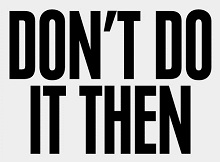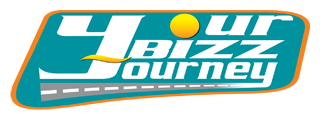
![]()
“I don’t” is one of the most powerful behavior changing phrases in your vocabulary.
 In a study published in the Journal of Consumer Research, researchers found the phrase “I don’t” is up to eight times more effective than saying “I Can’t.” And “I don’t” is more than twice as effective as saying “No”.
In a study published in the Journal of Consumer Research, researchers found the phrase “I don’t” is up to eight times more effective than saying “I Can’t.” And “I don’t” is more than twice as effective as saying “No”.
This is cool! If you want to change your certain behaviors, or even bring a shift in the culture of your team, start proclaiming what “you don’t do”. This is a powerful insight to increase your potential to achieve big, transformational goals.
A Clear Guideline for Success
“I don’t” creates a clear guideline for success.
In January this year, I began the Whole Life Challenge. It’s an 40 days program designed to stay away from Haram to change your behaviors, and it’s fun because the program is gamified.
This was done in a team — in my case a group of friends who pledged to stay away from riba (interest) — and score points every day for eating halal, exercising, drinking water, stretching, and other weekly lifestyle challenges.
The key to the program is what you don’t do. Over the 40 days. I’m strictly not eating or indulging in activity forbidden by Islam . It’s a year after year event of 40 days of Ayyam ul Taabudat to celebrate the milad of our Aqa Moula (tus) His Holiness Dr.Syedna Mohammed Burhanuddin (R.A.).
 Saying “I don’t” has been transformational. For ScanOn-Sticky Branding, I travel a lot as a keynote speaker and brand strategist. And I find it hard to eat well on the road. Between restaurants or getting a quick bite to eat between meetings, I struggle to make good choices. Since starting the Whole Life Challenge my choices are easier to make. The phrase “I don’t eat or do …” guides me.
Saying “I don’t” has been transformational. For ScanOn-Sticky Branding, I travel a lot as a keynote speaker and brand strategist. And I find it hard to eat well on the road. Between restaurants or getting a quick bite to eat between meetings, I struggle to make good choices. Since starting the Whole Life Challenge my choices are easier to make. The phrase “I don’t eat or do …” guides me.
For example, last night I was out for dinner with friends, and I said “I don’t Drink” — and it was definitive. I didn’t have to do any internal negotiations or rely on my willpower. I just did, because I said what I don’t do.
By stating what you don’t do, or what your team doesn’t do, provides you the freedom to make better choices.
“I Don’t” vs “I Can’t”
In the “I don’t versus I can’t” study, the researchers split participants into three groups:
![]() (1) The Control Group.
(1) The Control Group.
This group was not given a strategy. They were told to “just say no” when they felt tempted or might lapse from their goals.
![]() (2) The “I Can’t” Group.
(2) The “I Can’t” Group.
This group was coached to say “I can’t” when they felt tempted or might deviate from their goals. For example, “I can’t eat popcorn.”
![]() (3) The “I Don’t” Group.
(3) The “I Don’t” Group.
The third group was coached to say “I don’t” to overcome being tempted or avoid a lapse from their goals. For example, “I don’t eat popcorn.”
The results paint a vivid picture:
- 3 out of 10 members of the Control Group achieved their goals over ten days.
- 1 out of 10 members of the “I Can’t” Group achieved their goals over ten days.
- And 8 out of 10 members of the “I Don’t” Group achieved their goals over ten days.
A simple phrase — “I don’t” — drives behaviors, reduces reliance on willpower, and makes you more successful.
Apply “I Don’t” to Your Brand in Your Business & Professional Life
“I don’t” is a powerful phrase for accomplishing goals and changing behaviors, but it also has an interesting correlation to your brand.
The connection is with your corporate values and culture.
At times I typically find value statements a colossal waste of time. Featuring posters of your core values around the office turn into white noise. They’re there, but no one sees them. And worse still, no one knows what to do with “respect,” “integrity,” “communication,” and “excellence.” (As a side note, if those happen to be your corporate values it might be worth updating them. Those were ENRON’s core values too!)
Apply “I don’t” or “we don’t” statements to mobilize your team and heighten awareness of your firm’s values.
For example:
We don’t leave a customer on a long hold.
We don’t compete on price.
We don’t discriminate.
We don’t do business in credit terms
We don’t deal in interest in any forms of transactions
Take what you believe and convert them into action statements. This makes your values more actionable, memorable, and relevant.
These internal behaviors translate externally to your brand. Your brand is built from the inside out — from the way you work to the way you innovate to the way you interact with customers and partners.
By heightening your firm’s focus on what it doesn’t do makes it focus more on what it does do brilliantly!
Disclaimer: The opinions expressed within this article are the personal opinions of the author. The facts and opinions appearing in the article do not reflect the views of YourBizzJourney and YourBizzJourney does not assume any responsibility or liability for the same.



I Don’t agree to the “I don’t” per se as it sounds negative, and instead always suggest what you can do..! However, in the context of this article I feel that it is good enough to say “I Don’t” honestly & directly without feeling guilty and emotional and strengthens your assertiveness..! A very powerful strategy in Business to re-affirm your core values.